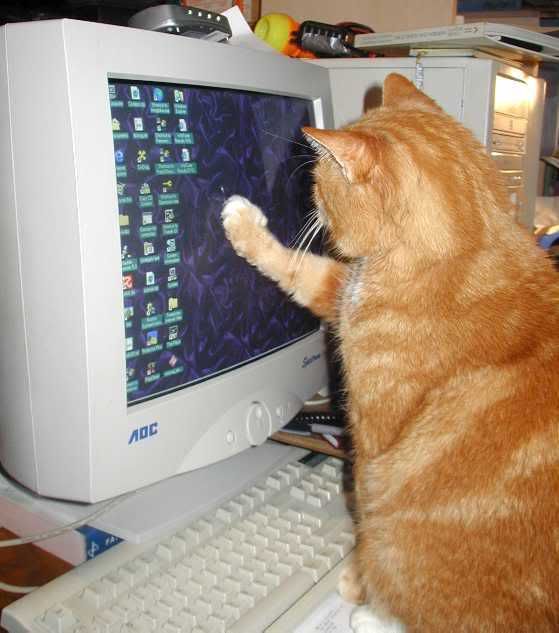|
|
Post by TheWallsScreamedPoetry on Jan 18, 2005 11:40:54 GMT
THE DOORS BRIGHT MIDNIGHT: LIVE IN AMERICA
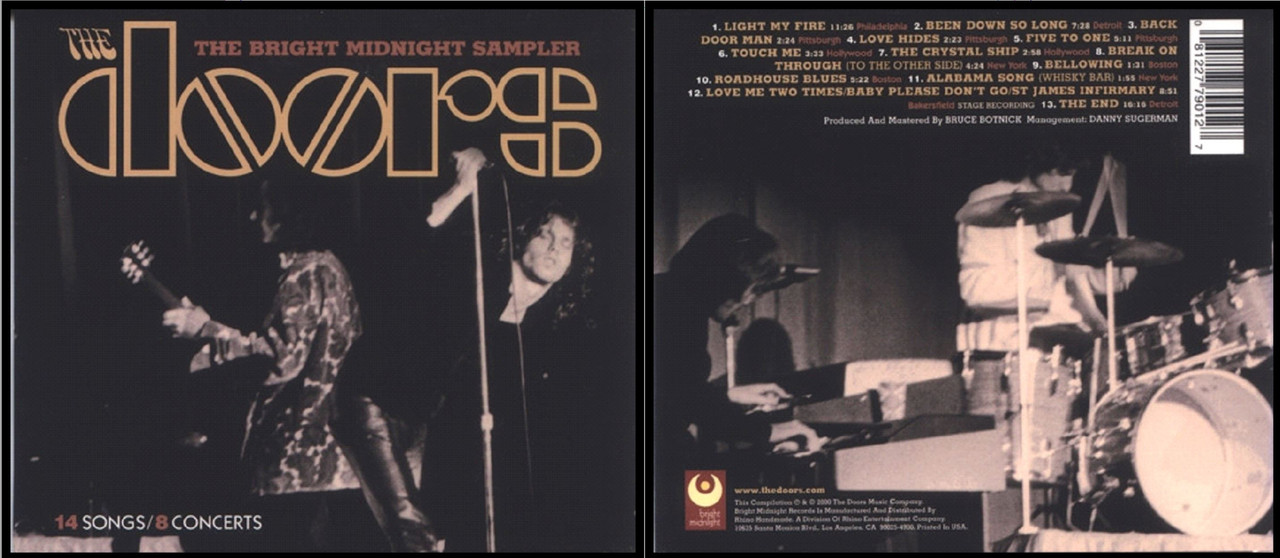
These unreleased recordings were recently discovered when consolidating the band's audio and film works, which had been scattered around the world in various record-company storage facilities. As a result, literally dozens of hours of never-before-released performances have come to light. In all, The Doors recorded approximately 12 concerts in seven cities; some of these songs were released in 1970 on Absolutely Live.
For almost three decades these concert recordings sat on storage shelves. After the overwhelmingly positive response to the Live In New York disc from The Doors' box set, Doors fans pointed out that over a dozen concerts had been professionally recorded and demanded to know what had happened to them. Subsequently, the remaining Doors: John Densmore, Robby Krieger, and Ray Manzarek as well as band manager Danny Sugerman, began reviewing every live tape and came away impressed by what they had heard.
These live recordings successfully capture a wide range of exciting Doors music from the drunken, over-the-top Boston concerts, to the intense, bluesy show in Detroit, to the stunning performances in Hollywood. This limited edition Bright Midnight: Live In America contains 14 live performances recorded at eight different venues during The Doors' 1969 and 1970 tours. It includes one of only three live versions of 'The End' in existence, and was produced and mastered by longtime Doors engineer Bruce Botnick.
Of course the band made a massive fuck up sending out hundreds of copies (including mine) without cover booklets.
I never got one.
Musically it was in and out but was a taster for what we expected was to come.
Sadly even Danny's enthusiasm could not disguise the half arsed way it was done.
Not to say there weren't some classic gems but the amount we had to shell out due to their incompetence in not making it easier for fans to buy them.
I once had to pay 100% mark up from UK Customs for one of my purchases and the suggestion to Jampot to mark them as gifts showed what he was when he showed he did not give a fuck.
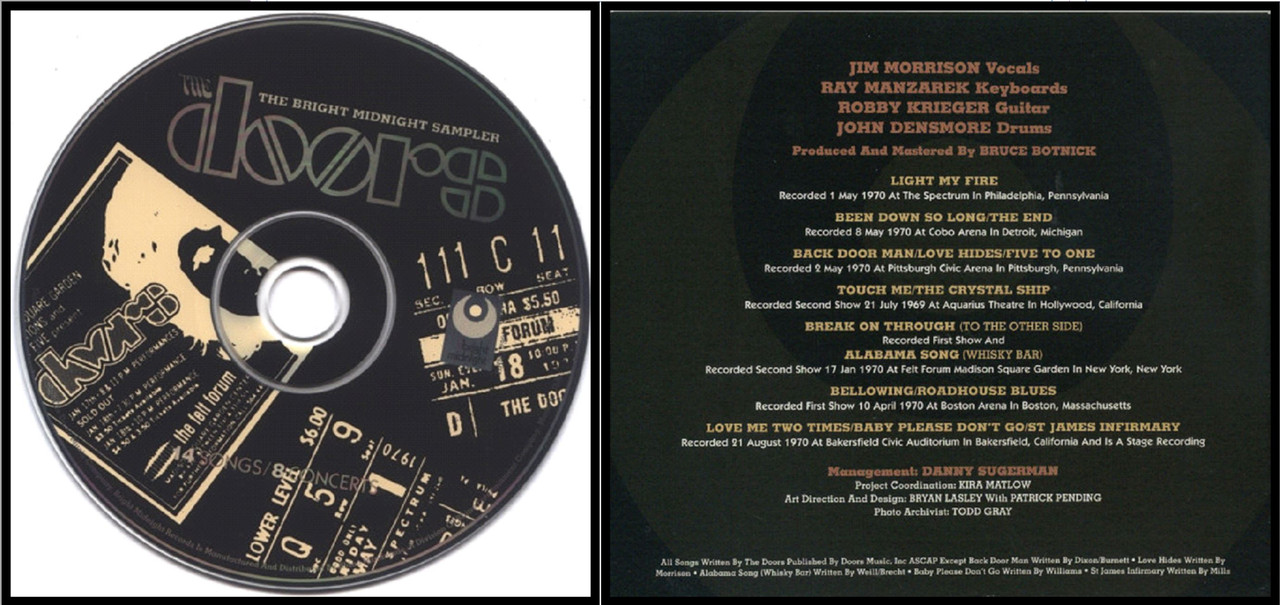

This 13-Track 14-Song Collection Of Audio Delights From THE DOORS' Archive Presents Previously Unreleased Performances From 8 Venues On The 1969 And 1970 United States Tours. It Is Both A Stunning Listen From Beginning To End As Well As A Wonderful Invitation To The Bright Midnight Archives' Releases To Come.
1. LIGHT MY FIRE 11:26 Recorded 1 May 1970 At The Spectrum In Philadelphia, Pennsylvania
2. BEEN DOWN SO LONG 7:28 Recorded 8 May 1970 At Cobo Arena In Detroit, Michigan
3. BACK DOOR MAN 2:24 Recorded 2 May 1970 At Pittsburgh Civic Arena In Pittsburgh, Pennsylvania
4. LOVE HIDES 2:23 Recorded 2 May 1970 At Pittsburgh Civic Arena In Pittsburgh, Pennsylvania
5. FIVE TO ONE 5:11 Recorded 2 May 1970 At Pittsburgh Civic Arena In Pittsburgh, Pennsylvania
6. TOUCH ME 3:33 Recorded 21 July 1969 At Aquarius Theatre In Hollywood, California
7. THE CRYSTAL SHIP 2:58 Recorded 21 July 1969 At Aquarius Theatre In Hollywood, California
8. BREAK ON THROUGH (TO THE OTHER SIDE) 4:24 Recorded 17 Jan 1970 At Felt Forum Madison Square Garden In New York, New York
9. BELLOWING 1:31 Recorded 10 April 1970 At Boston Arena In Boston, Massachusetts
10. ROADHOUSE BLUES 5:22 Recorded April 1970 At Boston Arena In Boston, Massachusetts
11. ALABAMA SONG (WHISKY BAR) 1:55 Recorded 17 Jan 1970 At Felt Forum Madison Square Garden In New York, New York
12. LOVE ME TWO TIMES/BABY PLEASE DON'T GO/ ST JAMES INFIRMARY 8:51 Recorded 21 August 1970 At Bakersfield Civic Auditorium In Bakersfield, California And Is A Stage Recording
13. THE END 16:16 Recorded 8 May 1970 At Cobo Arena In Detroit, Michigan
|
|
|
|
Post by TheWallsScreamedPoetry on Jan 18, 2005 11:46:01 GMT
This was the promise we so much looked forward to a lifetime ago when BMR seemed set to share all the wonders in its archives with those that should matter most to The Doors .....thier fans. Sadly the brief glimpse of Bakersfield and Pittsburgh along with the wonderful peek into the Boston concert were nothing but an illusion as lies, incompetence, greed and deceit overcame those involved and the most telling thing of all must be on the discography at RayManzarek.com where there are today seven live concerts by a stupid tribute act but only THREE by the reason that stupid tribute act exists. Bloody criminal in my eyes......  |
|
|
|
Post by TheWallsScreamedPoetry on Feb 8, 2005 20:02:10 GMT
The Doors: Bright Midnight/Live In America (Elektra)
ONE BRIGHT MIDNIGHT: 2 songs from 1969 & 14 songs from 1970, a moment of magickal cusp, a genuine celebration, a true revelation, a breathtaking apocalypse then in every sense of that buried-shell occult word.
Even speaking as a fan, and someone at times only half convinced by the slim Jim myth, even with the driest ear in the world, there is a current here of such naked rock and reach and roleplay as we simply don’t anticipate any more. (And how sad is that?) They SO do sound live: SO undead, and sublimely haunted, and hunted, and digging deeper into their axis. They also - it probably needs to be said - sound so much a unit, and not just The Lizard King and his Lucky Klingons; one of the virtues of Bright Midnight is that it shows the towering sonic glory of The Doors: this is musick in full ritual flower and not just one Handsome Myth and his Doorboys. If anything, it comes close to reversing the mint of the myth - you can hear, here and barely there, how Morrison might have sounded - at out-of-it times - like a crude Bluesy boor without the Baroque roll and curlicue of these supremely adroit musicians. (E.g.: ‘Bellowing/Roadhouse Blues’ comes close to being embarrassing, the unthin Jim to come forming before our ears, the fathead slug bursting the seams of the beautiful young chrysalid imp.) As witness: Krieger’s sidereal wave/weave of a solo on ‘Back Door Man’ (a tonal fissure, a mood jangle), or Manzarek’s odd angular organ lines on ‘Light My Fire’ - in fact the whole of the latter song as set on fire here is just beyond belief, a bringing down of thunder but also this so delicately assembled fugue; there is a moment when Densmore’s drum shot hits, the familiar-as-fuck Escher-sketch organ figure returns and you realise precisely how much the music is an exact sonic echo of Morrison’s "- the time to hesitate is through!" Divinely simple complexity.
This is a genuinely polymorphous music - the kind of sounds you forgot rock bands could make. ‘The End’ - despite the accretions of mythic time - is awesome, like something unhuman, primoridal, vomited from the earth. Each performance here sounds like an End in itself, as if they knew they were playing on the edge or ledge of something - the night in question becoming, inexorably, the Night thrown into question. Orphic madness.
Of course, in the end, there is always Morrison - rising, ranting, risking, waiting (that extra pre-orgasmic moment) to exhale - always with something up his fringed sleeve, and always the one thing you least expected: his scream [in ‘Light My Fire’] or an improvised "Come on, sister! I LOVE thee!" [from ‘Been Down So Long’] and, most of all, always, of course, finally, extrapolating like a daemon during an endlessly elliptically apocalyptic ‘End’ - the very shining crazed raised embodiment of that line from Performance: "- the only performance that makes it - that really makes it... is the one that achieves madness." Only a VERY few people have ever been foolish or courageous enough to take on performance as something very like ritual and really see it through. This IS music as magickal ignition, a timeless breath taking glory - but it saddens, too. Because when its storm is over, Bright Midnight reminds you how far we have fallen from The Doors, how far we are from such dangerous ceremony, how weak are the "stars" in our sky tonight.
Ian Penman, Uncut, September 2001
|
|
|
|
Post by TheWallsScreamedPoetry on Mar 11, 2006 13:52:56 GMT
THE DOORS BRIGHT MIDNIGHT: LIVE IN AMERICA
There's something for everybody on these new Doors collections: Those looking for more reasons to crow about how insufferable Jim Morrison could be will find plenty of ammunition in the concerts documented on The Bright Midnight Sampler and The Doors Live in Detroit. And those who consider Morrison a poet and provocateur who slipped the Incense and Peppermints generation a strychnine cocktail will be similarly bolstered in their beliefs, particularly by No One Here Gets Out Alive, a fawning Doors documentary originally broadcast in 1979 and now finally released as a four-CD set.
The three Bright Midnight releases, available through the Doors' Web site (thedoors.com), and Stoned Immaculate, a tribute album with an all-star cast including Creed, Stone Temple Pilots and Aerosmith, continue the long-running expansion of the Doors franchise. For a group that managed only six studio albums while Morrison was alive, the Doors never seem to run out of product. Nor does the public's fascination with Morrison show any signs of abating nearly thirty years after the singer's death. These latest releases, flawed though they are, tell us why.
In the summer of 1969 and on into 1970, when the concerts collected on The Bright Midnight Sampler were recorded, Morrison had become an international punch line because he supposedly dropped his pants during a show in Miami. The stunt got the Doors blacklisted in some cities and turned the quartet into a circus act for a new mob of "rock & roll voyeurs," as Ray Manzarek calls them in the Alive documentary, who came not to commune with Morrison but to watch him implode.
"We're all in the cosmic movie. . . . You better have some good incidents happening and a fitting climax," Morrison announces at a Philadelphia performance. There are moments when he strains to provide that climax. Track nine, "Bellowing," is exactly what its title says: Morrison as blustering blooze parody. Caught up in one of his sub-Rimbaud moments, the singer blathers on in "Been Down So Long" about how "love hides in molecular structures" and pleads with a sweet young thing to "dump your load on me."
Yet it was Morrison's willingness to appear ridiculous that also made him great. If the other Doors -- Manzarek, guitarist Robby Krieger, drummer John Densmore -- reinterpreted rock as the moodiest of blues, Morrison saw it as a theater of chaos, an opportunity to be pursued with reckless, sometimes self-destructive zeal. He enjoyed making audiences squirm in confusion with his "Hello to the Cities" rant, and he thought nothing of interrupting his band to make speeches, browbeat fans or improvise nonsense ("Dead Cats, Dead Rats"). On a seventeen-minute "When the Music's Over" from Live in Detroit, the quartet journeys from spine-chilling climax to jaw-dropping absurdity and back again: Krieger's swooping guitar kicks the trapdoor from under Morrison's feet as he howls like a wounded animal; the singer moans about how he wants to hear "the scream of the butterfly," and Manzarek responds with a flutter of organ notes; Densmore makes his trap kit quiver, rattle and rumble in anticipation of the concluding scream. It's a marathon ride with a band at its peak, three superbly conditioned musicians counterpunching with a singer who fears nothing -- least of all the possibility of making a complete fool of himself.
A battle-tested looseness makes the Detroit set and much of Bright Midnight a satisfying introduction to the Doors in their latter days. Morrison still veers from bombastic to brilliant, but he sounds like he's having fun with his monstrous image rather than succumbing to it, especially when he drawls, "Your ballroom days are over, baby" on "Five to One." The problem with No One Here Gets Out Alive is that it sticks so faithfully to the Morrison-as-rock-deity script, without a single dissenting voice to bring some sanity, or at least a modicum of humor, to the rampant hero worship. Noted literary critic Krieger proclaims his old pal "one of the most important poets of the last fifty years," and the Doors suggest that they wouldn't be surprised if Morrison were still alive.
Of course, he isn't, because if he were he'd probably want to kick the ass of just about everybody involved in Stoned Immaculate, including the surviving Doors themselves. Somehow Krieger, Densmore and Manzarek couldn't resist participating in their own tribute album -- how creepy is that? Creed turn "Riders on the Storm" from a ghostly crawl into an overblown rave-up, and somebody persuaded John Lee Hooker to "duet" with a recording of Morrison's voice on "Roadhouse Blues" -- a stunt that does neither legend any favors. Morrison had his faults, but he was never this calculated. In the end, he was rock & roll by refusing to live up to anyone's definition of it but his own. (RS 861)
GREG KOT from Rolling Stone 2002
|
|
|
|
Post by TheWallsScreamedPoetry on Feb 3, 2012 15:08:58 GMT
'Bright Midnight Live In America' (Elektra 7559-62656-2)
There's little or no faulting The Doors' studio output, but live they were always a different kettle of fish.
Concert tales abound of wild, drug- fuelled festivities, trance-inducing shamanic mantras, and of Jim Morrison flopping his old chap out in Miami. Of course, most people never saw The Doors, certainly not with Morrison fronting them, and have to make do with a relatively patchy output of live material.
The 'Bright Midnight' series sets out to redress this. That this album is taken from tapes of 14 Doors shows recorded in '69 and '70, left sitting on a dusty shelf for the past 30-odd years, is an indication that we could well see a number of individual shows released. For now, things have been kick-started by what is basically a 'greatest hits' live package collected from various shows.
Some of it works a treat - 'Alabama Song' and 'Love Hides' for instance. Lengthier epics 'Light My Fire' and the epochal 'The End' sound shabby and hollow, however, suggesting that The Doors had difficulty repeating on stage anything close to the fulsome sound of their studio recordings.
Like past Doors live fare, it's not exactly jaw-droppingly brilliant material, but fans will be satisfied.
*****
Jerry Ewing
Classic Rock Magazine August 2001
|
|
wplj
moderator 
Posts: 186
|
Post by wplj on Feb 7, 2012 14:17:57 GMT
Anyone ever notice the difference between The End on Bright Midnight and on Live In Detroit? It's the same recording, but on Bright Midnight, it is edited slightly weirdly ... On Detroit, Ray shouts "Stop the Car, etc etc," seemingly cutting off Morrison mid-song ... this bit is not exactly excised from Bright Midnight (you can hear Ray faintly if you listen, like he's been mixed down). Why? And why did Ray jump in with Stop The Car? Was he trying to prevent Jim from doing something controversial? More questions than answers, as usual.  Anyone have any ideas? |
|
|
|
Post by casandra on Feb 7, 2012 16:13:49 GMT
I don’t know, maybe Jim was absentminded during the song and Ray wanted Jim recited the poem Ensenada that contained that verse.
Ensenada the dog crucifix
The dead seal
Ghosts of the dead car's son
Stop the car
I'm getting out
I can't take it
Hey lookout there's somebody coming
And there's nothing you can do about it
I believe that Jim used to recite this poem in the middle of The End.
|
|
wplj
moderator 
Posts: 186
|
Post by wplj on Feb 7, 2012 17:28:37 GMT
I know about the poem; The Strange Doors throw part of it into The End every time we play it!  I just wonder why Ray jumped in with it ... Jim was not doing it ... Ray just sounds to me like he was nervous and doing it to keep Jim from going somewhere he thought would be bad ... Miami was not a distant memory yet. Maybe I'm reading too much into it. But it just sounds hokey with Ray butting in, "Stop the car! Stop the car ... stop the car!" |
|
|
|
Post by casandra on Feb 7, 2012 18:55:19 GMT
Yes, he sounds hokey and meddler    I just wonder why Ray jumped in with it ... Jim was not doing it ... Ray just sounds to me like he was nervous and doing it to keep Jim from going somewhere he thought would be bad ... Miami was not a distant memory yet. Ray always seemed to want to have everything under control, but Jim always seemed to slip out of his hands.  For that, I like the chattering of L.A. Woman. Jim seemed to have the control into the studio and not Ray. If I didn't understand bad, Jim said to the guys a couple of times: "Gentlemen, get serious". This is contradictory with Dicillo's view in When you're strange when he talked about the recording of L.A. Woman and Jim Morrison drunken, depressed and drugged in cocaine. I don't say that he was not that way sometimes, but not all the time. |
|
wplj
moderator 
Posts: 186
|
Post by wplj on Feb 7, 2012 20:17:18 GMT
It sounds to me like they were all horsing around in the studio; Jim's "let's get serious" comment sounds like it was heartfelt, but also done with a smile on his face. From the sound of the studio chatter on this disc, it just plain sounds like The Doors were (whisper it) HAVING FUN making this record. And isn't that, ultimately, what making music is all about? They are just regular folk like you and me, at the end of the day. The only difference is they were in a successful and influential rock and roll band in the mid 60s - early 70s. And they did their job very well.  |
|
|
|
Post by casandra on Feb 7, 2012 20:27:45 GMT
Returning to the subject, I would not have been surprised with those Ray’s cries during the Boston concert 1970, which was quite chaotic, but in Detroit? All seemed pretty quiet in that concert. Do not you think?
|
|
wplj
moderator 
Posts: 186
|
Post by wplj on Feb 7, 2012 22:09:18 GMT
I agree. The fact that this happened at the Detroit gig makes it stand out. Ray (and probably Robbie and John as well) must have been very nervous about any little thing Jim might have done at these shows that could jeopardise their career (again).
|
|
|
|
Post by casandra on Feb 8, 2012 16:36:34 GMT
Perhaps these were only untimely shouts which were recorded for "eternity", but they didn't intend any specific purpose. Just for you and me talk about them, and have a good time.    |
|
wplj
moderator 
Posts: 186
|
Post by wplj on Feb 8, 2012 19:54:44 GMT
Quite possibly, yes!  |
|
|
|
Post by TheWallsScreamedPoetry on Feb 9, 2012 9:38:47 GMT
Well Ray used to make such interjections in the early days so maybe he just got carried away. This was the days of the so called 'fuck' clause when the law were watching The Doors for any infractions. Also Detroit is unusual as that was the night Morrison over ran the concert and the band incurred a penalty and were banned from the Cobo Hall permanently so maybe he was worried about the cost  |
|
wplj
moderator 
Posts: 186
|
Post by wplj on Feb 9, 2012 10:12:10 GMT
I can buy it.  |
|
|
|
Post by TheWallsScreamedPoetry on Mar 1, 2024 16:37:57 GMT
Promo CD

Cassette Tape


UK CD  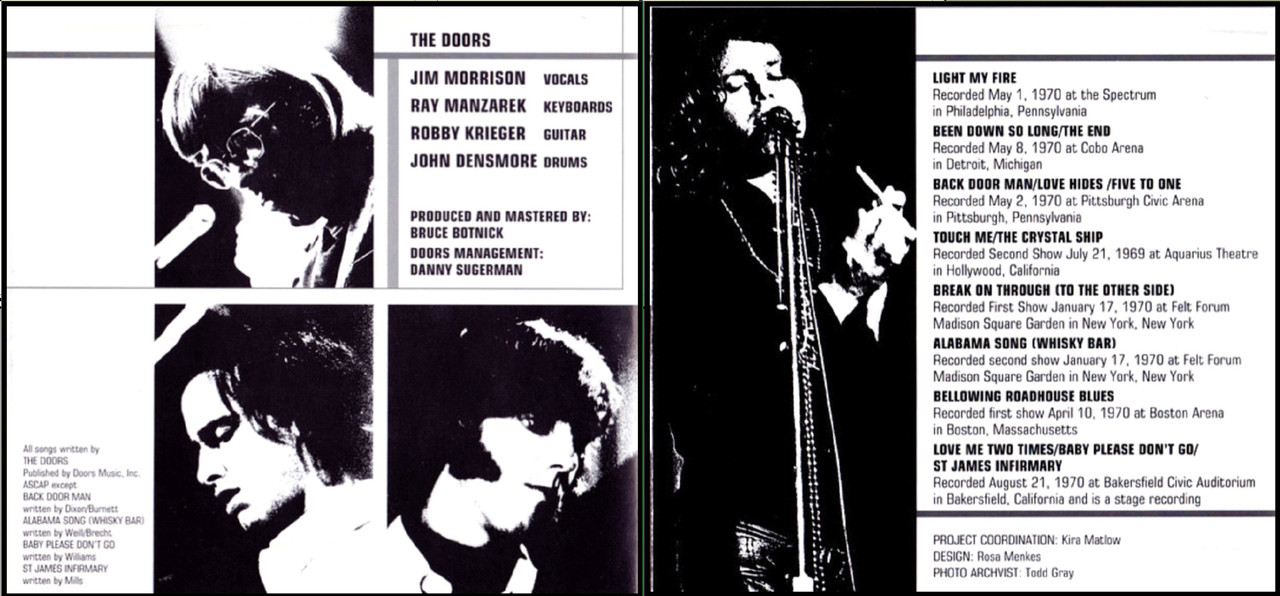 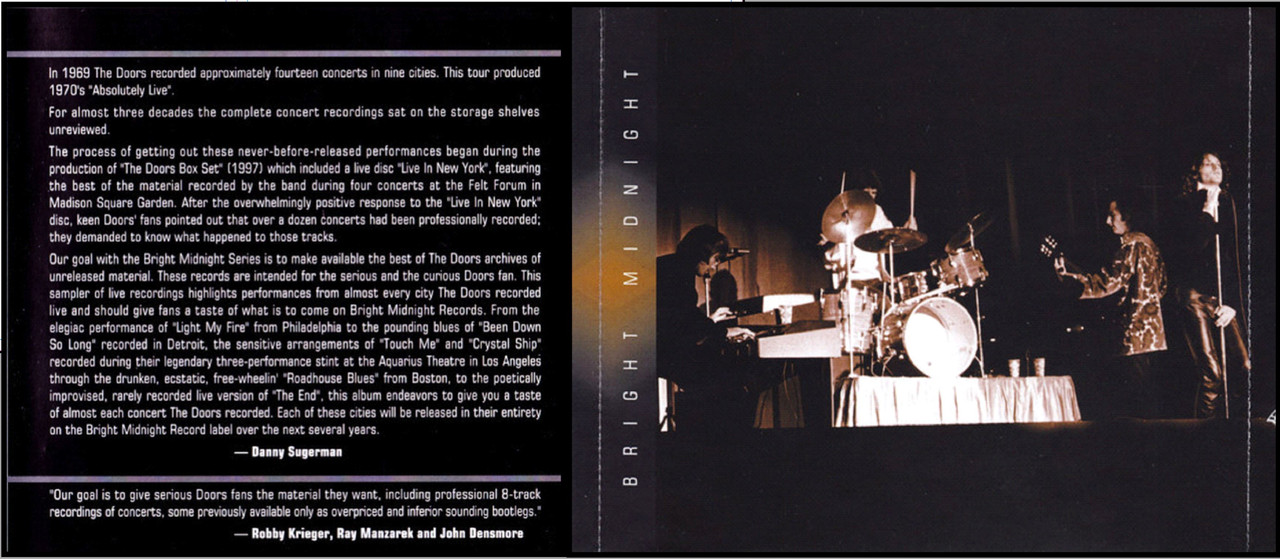
|
|







